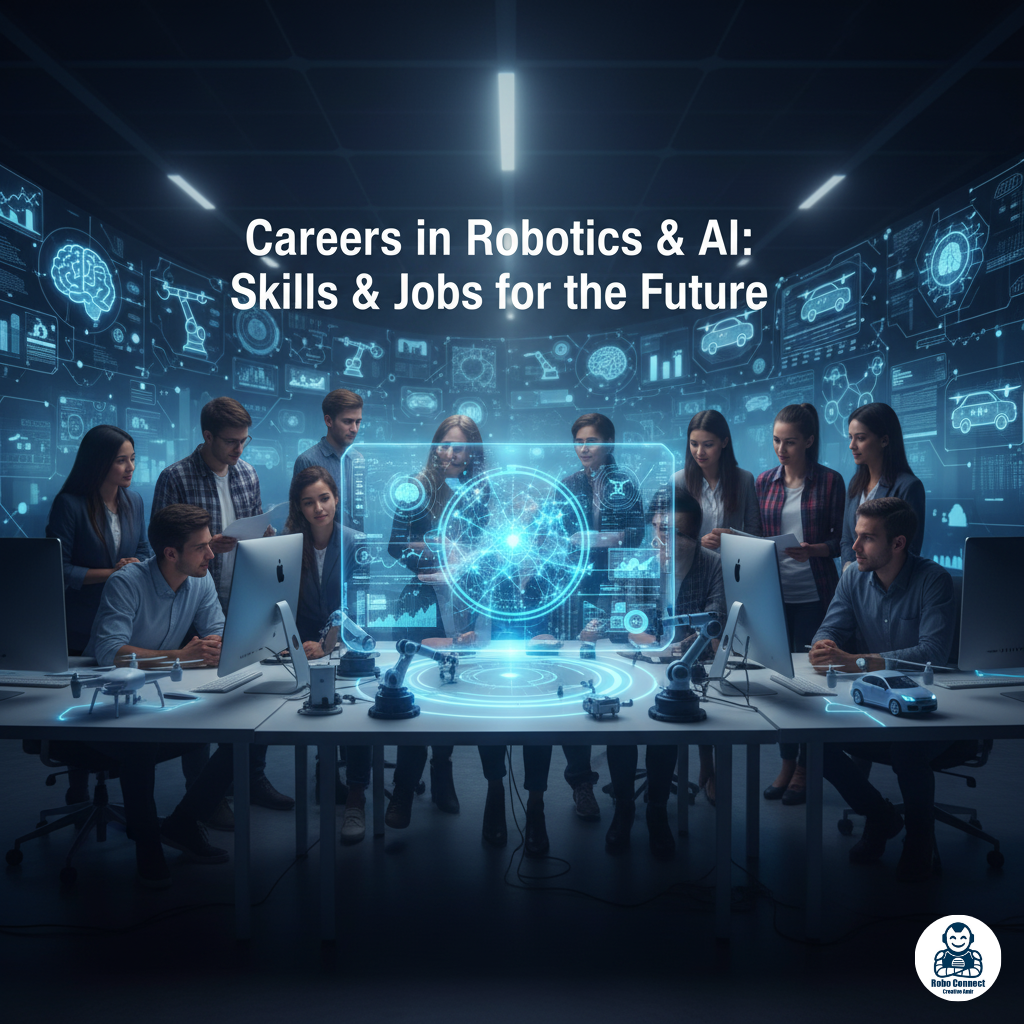Introduction
Robots are no longer science fiction — they’re assembling cars, performing surgeries, flying drones, cleaning our homes, and exploring Mars. Pair that with Artificial Intelligence (AI), and you get a new era of smart machines that require skilled humans to design, program, maintain, and manage them.
The demand for Robotics and AI careers is skyrocketing. According to reports, robotics and AI industries are projected to reach hundreds of billions of dollars in the next decade, with job opportunities growing alongside.
In this guide, we’ll cover:
- Why AI + Robotics is a booming career field.
- The top skills you need to get started.
- Different career paths and job roles.
- Industries actively hiring AI/Robotics professionals.
- Future outlook and advice for beginners.
Why Choose a Career in Robotics & AI?
- High Growth Industry → Technology is rapidly moving toward automation.
- Lucrative Salaries → Robotics engineers often earn above global engineering averages.
- Impactful Work → From healthcare robots to AI‑powered prosthetics, your work can directly improve lives.
- Future Proof → As automation grows, experts who build and manage robots will always be in demand.
Essential Skills for Robotics & AI Careers
- Programming
- Core languages: Python, C/C++, Java.
- For robotics tasks: MATLAB (simulation), ROS (Robot Operating System).
- For AI/Machine Learning: TensorFlow, PyTorch, OpenCV.
- Electronics & Hardware
- Understanding microcontrollers (Arduino, ESP), and microcomputers (Raspberry Pi).
- Control circuits, motor drivers, sensors, power systems.
- Mechanical Engineering
- Kinematics, 3D design (CAD), mechatronics.
- Actuators, gears, servo control, robotic arm mechanics.
- Artificial Intelligence
- Machine Learning & Deep Learning basics.
- Computer Vision, NLP (Natural Language Processing).
- Reinforcement learning for robotics tasks.
- Mathematics & Algorithms
- Linear algebra, probability, calculus → foundation for AI.
- Path planning algorithms (A*, SLAM, PID control).
- Soft Skills
- Problem solving & critical thinking.
- Team collaboration (robotics projects often require interdisciplinary teamwork).
Top Career Paths in Robotics & AI
- Robotics Engineer / Developer
- Role: Design, build, and test robots.
- Skills Needed: Mechatronics, electronics, coding, sensor/motor integration.
- Where: Manufacturing, healthcare robotics, defense.
- AI / Machine Learning Engineer
- Role: Develop AI models for robots (vision, navigation, speech).
- Skills: TensorFlow, PyTorch, ML algorithms.
- Where: Tech companies, autonomous driving, robotics startups.
- Embedded Systems Engineer
- Role: Program the low‑level firmware/software controlling robots.
- Skills: Arduino, STM32, C/C++, RTOS.
- Where: IoT robotics devices, drone systems.
- Robotics Research Scientist
- Role: Push boundaries of AI/ML in robotics.
- Skills: Strong academic/research background, advanced AI/robotics theory.
- Where: Universities, R&D labs, NASA, Boston Dynamics‑style firms.
- Automation Specialist / Control Systems Engineer
- Role: Integrate robotics into industrial automation lines.
- Skills: PLC programming, industrial robotics arms (Fanuc, ABB, KUKA).
- Data Scientist (Robotics Focus)
- Role: Analyze robotics data → train AI systems → predictive maintenance.
- Where: Autonomous vehicles, smart factories, logistics.
- AI Robotics Product Manager
- Role: Bridge tech & business → defining what robots should do, and why.
- Skills: Tech understanding + business acumen.
Industries Hiring in Robotics & AI
- Automotive: Self‑driving cars, automation in factories (Tesla, Toyota).
- Manufacturing: Assembly line robots, logistics robots.
- Healthcare/Medical: Surgical robots, exoskeletons, prosthetics.
- Defense & Security: Bomb disposal bots, surveillance drones.
- Space: NASA, SpaceX → Mars rovers, autonomous drones.
- Consumer Electronics: Personal assistants, robot vacuums, domestic bots.
Future Outlook
- AI and Robotics → expected to transform at least 50% of jobs in logistics, manufacturing, and healthcare in the next 10–20 years.
- Hybrid robots with AI cloud connectivity → from education to elderly care will become common.
- Demand will rise for ethics specialists (AI bias, safe deployment).
If you start building projects now (Arduino robots, Raspberry Pi bots), and build strong AI fundamentals, you’ll be future‑ready for this booming industry.
How Beginners Can Get Started
- Learn Arduino basics (line follower, obstacle avoidance).
- Move to Raspberry Pi (Python + sensors).
- Learn AI libraries (OpenCV → face/line detection).
- Join online robotics/AI courses (Coursera, Udacity, free YouTube).
- Work on small portfolio projects (AI robot car, IoT smart car).
FAQs
Q1: Do I need a degree to work in AI/Robotics?
Not necessarily — strong portfolios + certifications can land entry jobs. But for research roles, degrees (MSc, PhD) help.
Q2: Which pays more — AI or Robotics?
AI/ML engineers often have the highest salaries, but robotics engineers in industries also earn competitive pay.
Q3: Is coding absolutely necessary?
Yes — at least Python and C/C++ are essential for AI + robotics.
Conclusion
Robotics and AI are the technologies of tomorrow — but the careers are being created today.
- Strong demand in industries.
- High salaries .
- Opportunities to shape the future .
If you’re passionate about building robots that can think, start learning Arduino/Raspberry Pi, develop coding + AI skills, and explore beginner projects now. It may set you up for one of the most exciting career paths of the future.

